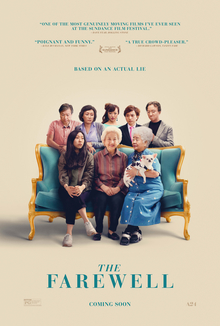
This is the latest of the recent spate of American Chinese films to receive critical acclaim and I admit that I have a particular fondness for them, being curious as to they might slowly shape the identities of ethnic Chinese in the United States. The Farewell is actually the most Chinese of these films yet. It does star Awkwafina who isn’t especially Chinese but the director here Lulu Wang was indeed born in China and only later moved to the US. The film itself takes place almost entirely in China, with only some brief scenes in the beginning set in the US.
Though born in China, Billi has grown up in the US but still talks regularly to her grandmother she calls Nai Nai in Beijing. She is suspicious when she learns that her parents are travelling to China to attend the wedding dinner of her cousin whose own family has moved to Japan but doesn’t want her to go. She finds out that the real reason for the trip is that Nai Nai has been diagnosed with terminal cancer and has only months to live. The family as a whole decides to keep this a secret from her grandmother and so has organized an early marriage as a pretext for everyone to visit her one last time. The family worries that Billi is too emotional and will give away the secret but she decides on her own to go back to China as well. When she arrives she assures everyone that she will keep the secret but feels conflicted upon seeing Nai Nai’s love for everyone and her passionate involvement in the wedding celebrations that feel fake to her.
This film won a ton of awards in the US and probably feels quite exotic and authentic to American audiences. To us in Asia, it’s nothing special and I’m a little leery of how true some of the anecdotes are. For example, are paid mourners really still a thing in China? Still this isn’t as bad as it could have been either and ends up being rather solid. It’s interesting both as a window into what modern China looks like to an American and how attitudes in the two countries continue to differ. It’s notable in particular that the deception the family engages in is done with the full knowledge and cooperation of the grandmother’s doctor who claims that it is normal practice. As this was apparently based on a real story, this feels significant. However I do feel that it seems to slag China in some minor ways that feel out of date, such as having the family check in to a hotel with elevators that are out of order. If anything, I would imagine that an American in China would be surprised by how all of the physical infrastructure looks so shiny and modern.
The film isn’t exactly eager to throw up anything too controversial either but there are some revealing gems in the conversations. Given the current tensions between China and the United States, it is notable that Billi’s family consider themselves as Americans of Chinese ethnicity even as her uncle who lives in Japan insists that Chinese are Chinese everywhere in the world. He later expounds about how lying to Nai Nai is a way of collectively taking on the emotional burden of the crisis at hand while the urge to tell the truth is selfish as it means laying the responsibility on others and washing your own hands of it. Unfortunately the film never goes any further than this and Billi, appropriately enough as an Asian, avoids directly confronting her elders over the matter. The film’s ending also tacitly acknowledges that there is something to her uncle’s advice. That makes it feel markedly different from an American film yet it also feels unearned as Billi has no real agency and is more or less a passive participant in her family’s affairs.
On the whole The Farewell isn’t that bad but it’s not that good either and it does seem that it’s so beloved by critics merely because of how unusually Chinese it is for what remains at heart an American film. If American audiences are interested in seeing what real life in China is life, it’s still better to watch actual Chinese films. The real prize here is to capture the identity conflict of being an American Chinese and here this film is just too timid to confront the real issues. Ang Lee’s early works does a far better job at depicting the Western-Eastern identity schism and he did so a generation earlier. This film simply cannot compare.